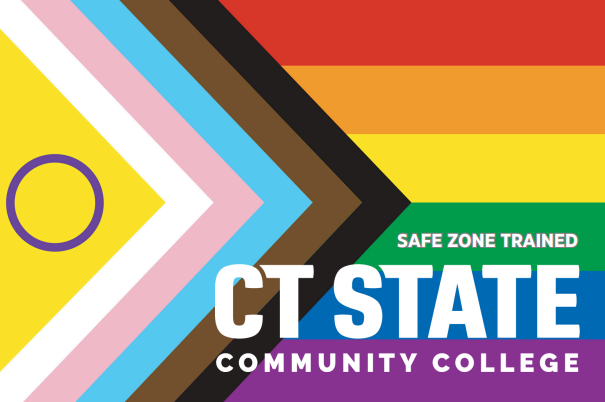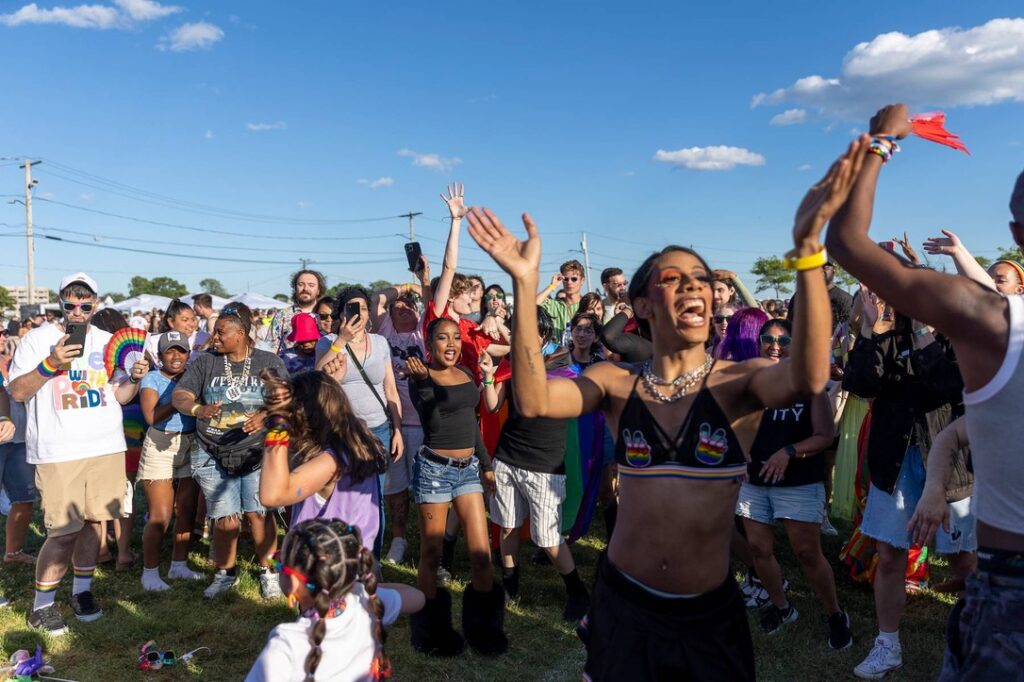Connecticut Colleges Work to Support Transgender Students
By Morgan Shay / All photos courtesy of the named organizations.

Amid recent policy changes—including the shutdown of DEI initiatives and LGBTQ+ support groups across many states—transgender college students are facing increased uncertainty.
However, in recent conversations with DEI professionals, including Dr. John-Paul Chaisson-Cardenas, Vice President of DEI of the Connecticut State Community College System, and Kelvin Rutledge, Associate Vice President for Institutional Inclusive Strategies & Change Management at Southern Connecticut State University, there is reason for students to feel reassured. On a federal level, there is controversy and uncertainty, which can leave students feeling vulnerable. However, on the state level, Connecticut remains relatively protected in terms of LGBTQ+ rights.
“At the state level, there’s nothing particularly pressing or emerging right now that’s causing concern. We’re paying much closer attention to developments at the federal level specifically, how programs, policies, or practices that ensure access and opportunity for certain groups might be challenged,” said Kevin Rutledge, Associate Vice President for Institutional Inclusive Strategies and Change Management at Southern Connecticut State University. “We’re actively tracking court cases to see whether those rationales will be used to target other policies.”
Chaisson-Cardenas echoes Rutledge and explains his commitment to protecting the rights of his students. “My job is to reassure them that we will protect their civil rights as written in both federal and state law. Remember, state law is strong in this area.”
Both Rutledge and Chaisson-Cardenas explain that within their DEI departments at their respective schools, they are going above and beyond to ensure transgender students feel supported and seen during the current political uncertainty. Whether that be encouraging students to come to their offices to voice their concerns, providing educational resources such as guides on their website, or community-centered events through LGBTQ+ organizations on campus. Cardenas wants people to know “when our students are in our walls, we want to make it a safe space for all of them. Even though there’s a lot of stuff going up federally that, quite frankly, none of us quite understand, this space is safe.”
Chaisson-Cardenas says that Connecticut State Community Colleges have and will continue to provide the training to create safe spaces, as they recently underwent special training to create these for all campuses. “Many of our staff and faculty have gone through training already, and people can recognize the completion of this training because they’ll see the symbol either in a sticker or on their door. That is a symbolic gesture that says, right here in this office, in this space, you should feel safe.”
Additionally, the Connecticut State Community College System published an educational guide that came out this past April. The guide, titled Creating an Equitable and Inclusive Environment for Transgender Students at Connecticut State Community College, provides information such as the gender-neutral bathroom policy, the importance of using the right pronouns, and additional resources such as those pertaining to mental health. “Those guides are really designed to support our faculty, staff, and students in supporting each other,” said Chaisson-Cardenas. “It’s about helping everyone find a sense of belonging.”
Rutledge also wants students to know that “as an institution we are committed to supporting our students wherever they come from or whoever they are. If there’s any fundamental message [we communicate], that is not changing.”
Rutledge explains how one of his main commitments is to connect students to resources including their Sexuality and Gender Equality center (SAGE), specifically their PRISM LGBTQIA organization. Rutledge wants students to know the support that SCSU has to offer, specifically for their LGBTQ+ students. “With the PRISM experience, sometimes there’s an activity, other times a meeting agenda that changes weekly throughout the fall and spring semesters,” said Rutledge. “Additionally, there’s an opportunity for trans students if they choose to come together and facilitate an ongoing weekly trans experience.”
Additionally, SCSU has an LGBTQ+ faculty and staff network. “[It is] a collective group of faculty and staff who are available for student support and engagement. This allows faculty and staff to show up for trans individuals, whether that’s connecting to resources off campus or just being able to have a support system one-on-one,” said Rutledge.
Rutledge adds that his priority is having these one-on-one conversations with students so that they can voice their concerns. “I always let people speak, and then I ask, were you speaking for me just to listen to you? Or were you speaking for a response and action? And if you can’t come into the office a virtual interview is possible, too”.
The possibility of shifting policies serves as a reminder now more than ever that the most important thing you can do is speak up, and stand up for what you believe in, whether you are a part of the transgender community or just an ally. As Dawn Ennis, Journalist and University of Hartford professor says, “Support your trans friends and peers. They need it. Maybe take one of us out to lunch, buy us a coffee, ask if there’s anything they can do. The number one thing allies need to do is stand up when legislation has passed, contact representatives, go to town halls, go to protests and demonstrations when someone makes a joke that targets trans or non-binary people. Stand up, speak out, fight back, make people aware that that’s not cool.”
Connecticut is Here to Support You
Triangle Community Center (TCC): Based in Norwalk, Connecticut, TCC is the region’s largest non-profit for LGBTQ+ people in Connecticut. Resources at TCC for those who are transgender include their gender affirming closet which provides gender affirming items such as chest binders, as well as a sewing machine, so people can also come in and alter clothing if need be. Additionally, TCC provides peer support groups both virtually and in person, open to anyone from the state. They are open Monday-Friday 10 a.m. to 6 p.m. There’s also a form on their website that allows you to sign up to volunteer with TCC or to start a group or program if one isn’t already offered. Visit ctpridecenter.org.
PFLAG Hartford
PFLAG Hartford provides support, education, and advocacy for LGBTQ+ people and their families. They see what the community is going through now and how important it is not to just take things for granted. The rights that have been gained, are at risk if community support is not strong. PFLAG Hartford provides support groups online and in person, called Rainbow Group’s (applicable to anyone who identifies as LGBTQ+.) Additionally, they provide support groups for parents, allies, or caregivers. Regarding the current uncertainty for transgender legislation, PFLAG Co-President Lindsey Pasquale said “We have people working in government affairs and staying actively engaged with everything happening both nationally and at the state level. They’re able to share that information with our different chapters and coordinate with other national groups”. With PFLAG, you’re able to get the support you need locally, but you also have avenues to get involved in on the advocacy and for the different issues affecting our communities. See more at pflaghartford.org.
Additional Support throughout the Connecticut State Community College System:
Northwestern administrative staff have partnered with the LGBTQ+ group, Flourish Club, for social programming and open dialogues during weekly club meetings.
Middlesex hosts a bi-weekly Relaxation Station that provides a safe space for relaxing activities and open discussions. They also host monthly Courageous Conversations in the library.
Three Rivers hosts Brewed Thoughts once a month; students are invited to engage in conversation with their peers facilitated by a member of the mental health coalition. Free tea and wellness activities are provided for those who wish to listen or engage in calming activities. Three Rivers hosts a Here, Queer, No Fear: LGBTQ+ Support Group offered on campus, hosted by Norwich Human Services. Norwalk offers Our Space, a weekly drop-in group for students interested in LGBTQIA2S+ student success to come together and chat, get support, and build community.
Additional Support Groups through 211 Connecticut:
Other groups doing work for transgender young adults include Q Plus, Prism and Middlesex Health through their Center for Gender Medicine and Wellness. Additional information for the support groups and resources provided by these organizations can be found through the 211 CT. Search for support groups at 211ct.org.









More Stories
Playing a Leading Role for A Century: Yale School of Drama
Connecticut Voice Honors Gala Honorees
Connecticut’s Colleges and Universities Welcome Back LGBTQ+ Students